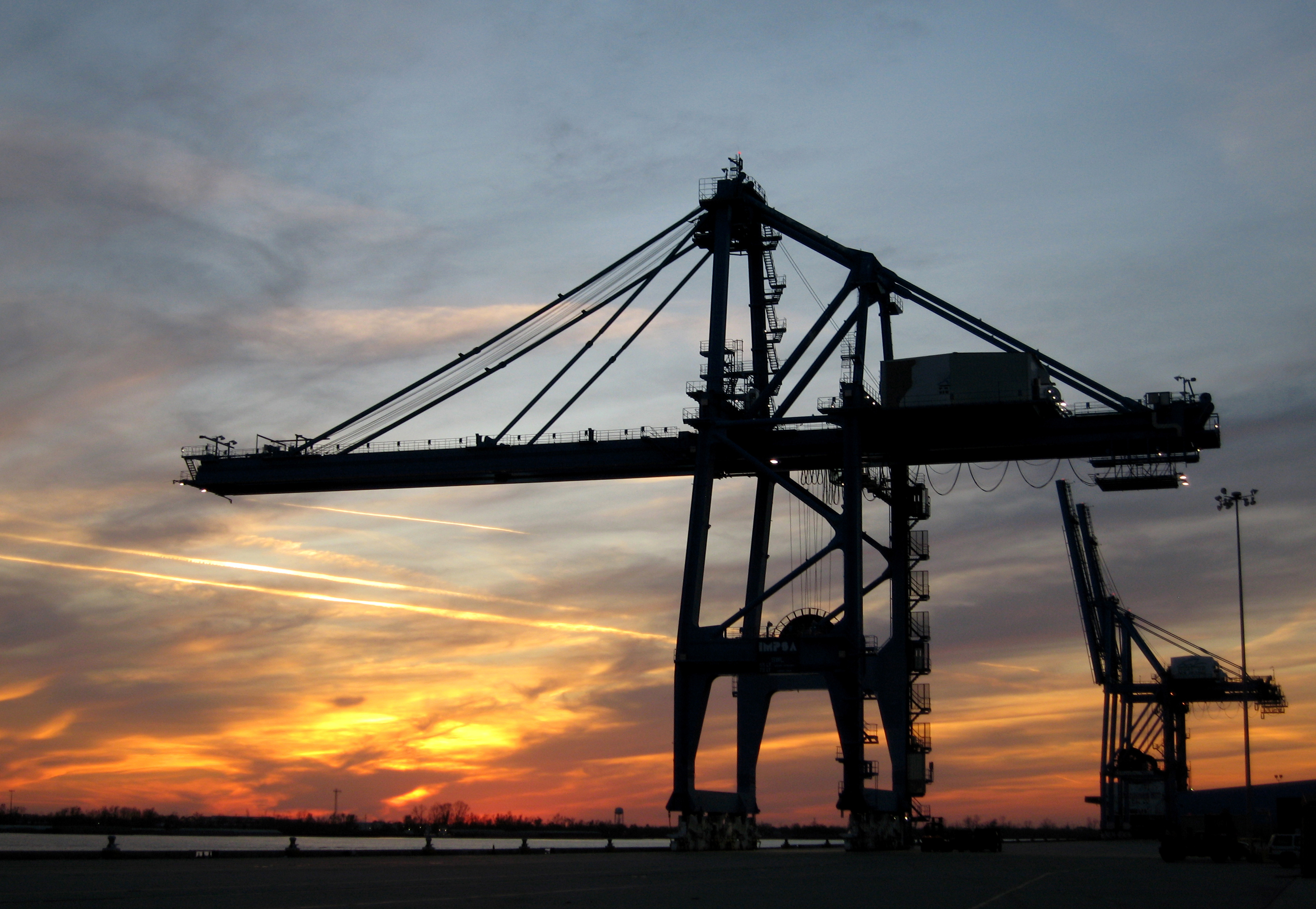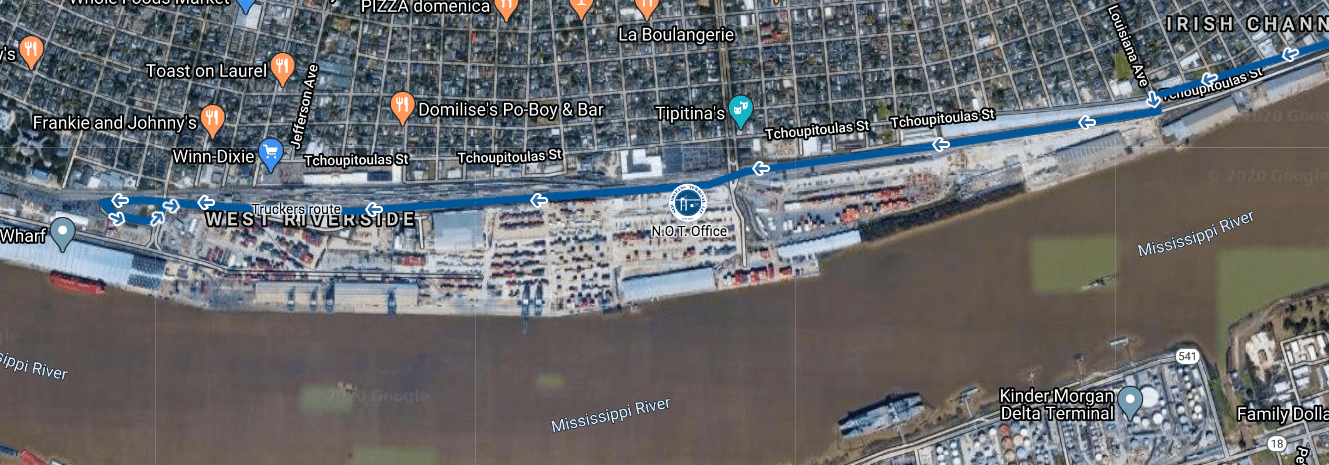Before entry is permitted at the N.O.T. Gate, please have the following information available.
Trucking company should have valid insurance and credit with the Steamship Line (SSL).
Import Pickups: Have the container number and/or bill of lading number readily available.
Empty Pickups: Know the valid booking number, container length, height and type. Provide SSL.
Export Deliveries: Have a valid booking number available along with the container length, height and type. Provide SSL.
If Applicable To Your Shipment:
- Have necessary documentation for all hazardous cargo
- Titles for cars
- Over dimensional measurements
- Reefer commodity and temperature
Empty Returns: Provide container length, height, type and SSL.
NOTE: For all gate transactions, an appointment must be made using the current FORECAST Appointment Website. Please be aware that this site will be changing in six months.
Quick Links:
Gate Hours:
Monday Through Friday • 700 AM -5:00 PM
Saturday & Sunday upon request
Latest Time For Appointments:
Imports Pickup • 4:00 PM
Double Moves • 4:00 PM
Live Reefers • 4:00 PM
Export Delivery • 4:00 PM
Restroom/Rest Stop Areas:
These areas are located at the Resolution Building.
Terminal Holidays
| Holiday | Day | Date | Status |
| New Year’s Day | Monday | 1/01/24 | Closed |
| MLK Day | Monday | 1/15/24 | Closed |
| President’s Day | Monday | 2/19/24 | Open |
| Lundi Gras | Monday | 2/12/24 | Half Day |
| Mardi Gras | Tuesday | 2/13/24 | Closed |
| Good Friday | Friday | 3/29/24 | Open |
| Memorial Day | Monday | 5/27/24 | Closed |
| Juneteenth | Wednesday | 6/19/24 | Closed |
| Independence Day | Thursday | 7/04/24 | Closed |
| Labor Day | Monday | 9/02/24 | Closed |
| Columbus Day | Monday | 10/14/24 | Open |
| Veterans Day | Monday | 11/11/24 | Open |
| Thanksgiving | Thursday | 11/28/24 | Closed |
| Day After Thanksgiving | Friday | 11/29/24 | Closed |
| Christmas Eve | Tuesday | 12/24/24 | Closed |
| Christmas | Wednesday | 12/25/24 | Closed |
| New Year’s Eve | Tuesday | 12/31/24 | Closed |
| New Year’s Day | Monday | 1/01/25 | Closed |
Over-the-road trucks MUST have follow the terminal traffic patterns.
For a detailed map illustrating these patterns, download below.
SAFETY MATTERS BECAUSE LIVES MATTER
It is the practice of the New Orleans Terminal to create a safe working environment for all employees and visitors.
- Drivers must have a valid TWIC to enter the Port of New Orleans complex.
- Trucks must have valid RFID tags and have their UTNS registered in the RFID Management System.
- UTN numbers must be clearly marked on the cabs.
- Drivers must wear their safety vests at all times while on terminal.
- Headsets of any kind are not allowed to be worn while on terminal. If you need to use the phone, pull over and stop at a safe location.
- Speed limit through the yard is 15 MPH.
- No walking in the stacks, drivers must remain in their cab in order to be serviced.
- All drivers must follow the traffic patterns.
- No running stop signs.
- No driving against one-way traffic.
- No U-Turns in the roadways.
- Keep travel lanes open for RTG’s, travel in designated areas only.
- Seatbelts must be worn while operating any vehicle.
- Drivers are to unlock pins under the second inbound canopy.
- All bobtails must use the specified lanes when entering or exiting the terminal.
- Any violations on the above will result in suspension from both container terminals.
- No passengers are allowed in trucks except for driver training purposes only. Driver training must be preapproved. Both drivers must have TWIC cards and possess a copy of the approval email.
Contact For Police, Emergency and Suspicious Activity
Richard Schaefer • (504) 813-8800
Questions? Contact N.O.T.
General inquiries • [email protected]
Gate • [email protected]
CFS • [email protected]
Yard • [email protected]
Customs • [email protected]
Vessels • [email protected]
Marine Manager • Lester Loubat • [email protected]

Driving Directions To New Orleans Terminal
50 Napoleon Avenue • New Orleans, Louisiana 70115
- From I-10 East or West, exit at U.S. 90W (Exit 234A).
- Exit U.S. 90E at Tchoupitoulas (Exit 11C). This will be the first exit after crossing the Mississippi River on the Crescent City Connection Bridge.
- Follow down ramp to ground level and turn right at the second stoplight onto Tchoupitoulas Street.
- Keep in the right hand lane onto Clarence Henry Truckway.
- Continue down to the Resolution Circle. Go approximately four miles then come back up and enter the terminal via the riverside flood wall. (Pass the flood gate opening, make the loop as a U-turn and come back around to the terminal.)

Port Schedule
| Vessel Name | InVoy | OutVoy | Service | Estimated Arrival Date/Time | Estimated Departure Date/Time |
| PORTO CHELI | 423W | 428E | MEDG | 2024-07-27 07:00:00 | 2024-07-27 22:00:00 |
| MAERSK MEMPHIS | 424E | 429W | LNST | 2024-07-28 07:00:00 | 2024-07-28 22:00:00 |
| HUBERT SCHULTE | 426W | NG429 | TA3 | 2024-07-29 07:00:00 | 2024-07-29 19:00:00 |
| MSC MARIANNA | 425W | MF430 | MEDG | 2024-08-01 07:00:00 | 2024-08-01 19:00:00 |
| MERIDIAN | 429N | 431S | CAMX | 2024-08-01 07:00:00 | 2024-08-01 19:00:00 |
Glossary of Common Terms
AMS
Automated Manifest System is a computerized system used by the U.S. Customs and Border Protection (CBP) to process import cargo invoices or manifests.
AQI Exam
Agricultural Quarantine Inspection is an inspection done in order to intercept prohibited plant life, pests, and other hazardous materials.
Bill Of Lading (BOL)
A Bill of Lading is a receipt for the cargo and a contract for transportation between a shipper and the ocean carrier which is used as a document of ownership.
Bonded Warehouse
A warehouse designated by U.S. Customs for temporary storage of goods until fees are paid or otherwise properly released and cleared by Customs.
Breakbulk
Breakbulk is cargo which does not classify as a full container and is considered loose freight.
C.E.S.
Centralized Examination Station is an exam site designated by U.S. Customs for various exams such as VACIS, C.E.T., etc.
C.E.T. Exam
Contraband Enforcement Team (CET) Exam is a physical examination of cargo normally done to protect from narcotics, drugs or weapons.
C.F.S.
Container Freight Station is a shipping dock where cargo is loaded, stuffed, unloaded or stripped from containers.
Chassis
A chassis is a wheeled flatbed trailer on which to mount a cargo container for transport.
Delivery Order (D.O.)
A document issued by the consignee or a customs broker as authority to release the cargo to the inland carrier.
Demurrage
Demurrage is a storage charge levied on cargo after the allowable free time has expired.
E.D.I.
Electronic Data Interchange is an electronic communication system used for exchanging data via electronic means.
FIRMS Code
Facilities Information and Resources Management System is a code assigned by U.S. Customs to freight terminals and is required on import paperwork, inbound transit orders, and other Customs documents. Facilities with the ability to transmit information directly to U.S. Customs must have this Customs-assigned code.
General Order (G.O.)
G.O. status given to imported goods that are missing the proper documentation or are not quickly cleared through Customs. Merchandise may be held under general order if the proper duties or taxes are not paid, or if the owner fails to complete the required customs paperwork. Goods will be held under general order if they remain uncleared for more than 15 days.
Genset
A genset is a portable generator which can be attached to a refrigerated container to power the refrigeration unit during transit.
Hold On Dock (H.O.D.)
H.O.D. is a request issued by Steamship Line to prevent an export container from going out on a vessel.
Lien
A lien is a legal claim upon goods for the satisfaction of unpaid fees usually for containers taken to a G.O. or CES warehouse.
Manifest
Manifest is a list of all cargo loaded on board a vessel.
OBL
Original Bill of Lading
Per Diem
Per diem is a fee charged by the steamship line upon a trucker due to late return of equipment.
Permit To Transfer (PTT)
Permit To Transfer is issued by US Customs and allows a container that was on Customs hold to be released to a non CES authorized trucker.
RFID tag
The Radio Frequency Identification tag is required to be on all trucks seeking entry to a container terminal.
SCAC
Standard Carrier Alpha Code is the recognized transportation company identification code issued by NAMFTA.
Shipside Exam (also called Tailgate/Pop/Tap)
An exam made on the terminal in which U.S. Customs pops the seal on the container and looks inside it without handling the cargo.
TWIC
The Transportation Worker Identification Credential program is a Transportation Security Administration (TSA) and U.S. Coast Guard initiative in the United States. The TWIC program provides a tamper-resistant biometric credential to maritime workers requiring unescorted access to secure areas of port facilities, outer continental shelf facilities, and vessels regulated under the Maritime Transportation Security Act of 2002 or MTSA, and all U.S. Coast Guard credentialed merchant mariners.
T.I.R.
Trailer Interchange Receipt is a document showing condition of container/equipment at the time of interchange.
USDA Exam
United States Department of Agriculture Exam is completed to check the condition of pests or other insect’s infestation.
UIIA
Uniform Intermodal Interchange and facilities Access Agreement is a standard industry contract between truckers/drayage companies and water/rail carriers and leasing companies (Equipment Providers).
VACIS Exam
Vehicle And Cargo Inspection Systems Exam uses gamma ray technology to produce images of tankers, commercial trucks, sea and air containers, and other vehicles for contraband such as drugs, weapons, and currency.